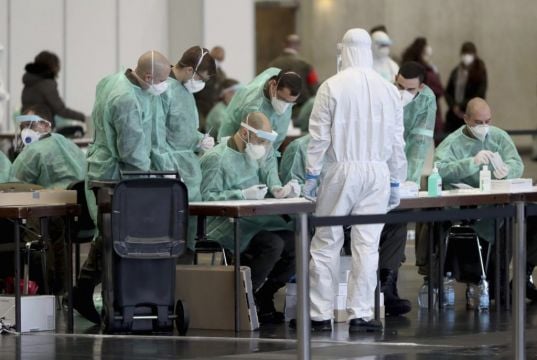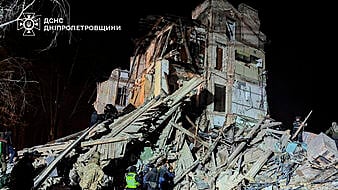Several communities in the Austrian Alps have put mass coronavirus testing on hold and others were urged to do the same after a storm dumped huge amounts of snow, sending some avalanche warnings to their highest level.
Some areas of the province of Tyrol saw 70cm (27.5ins) of snow fall overnight Friday into Saturday, and another 110cm (43ins) were expected on Sunday, Austria’s APA news agency reported.
In East Tyrol, 500 households were left without electricity after trees brought down power lines and the avalanche warning was at its highest level of 5. Several areas in East Tyrol postponed virus testing.

On Friday, Austria started a voluntary mass testing program that officials hope will prevent long, hard lockdowns in the future.
The fast antigen tests started in Vienna and in the westernmost Vorarlberg and Tyrol provinces.
Over the first two days, some 300,000 people were tested out of Austria’s nearly nine million population.
The government is hoping that several million will have been tested by mid-December.
Meanwhile, coronavirus infections in Russia hit a new record on Sunday, as the country’s authorities registered 29,039 new confirmed cases, the highest daily spike in the pandemic.
Russia’s total of over 2.4 million reported infections remains the fourth largest caseload in the world. Russia has also reported 43,141 virus-related deaths.

The country has been swept by a resurgence of the virus this autumn, with daily confirmed infections and deaths significantly exceeding those reported in the spring.
Nevertheless, Russian authorities have rejected the idea of another nationwide lockdown or any widespread closures of businesses.
On Wednesday, President Vladimir Putin ordered a “large-scale” vaccination against Covid-19 to begin in Russia with the domestically developed Sputnik V vaccine that is still undergoing advanced studies needed to ensure its safety and effectiveness. Doctors and teachers will be first in line.
Sputnik V has been offered to medical workers for several months even though the vaccine was still in the middle of advanced trials.
Health minister Mikhail Murashko said on Wednesday that more than 100,000 people in Russia had already received the shots.
Elsewhere, South Korea says it will further toughen physical distancing rules as recent restrictions have failed to curb a viral resurgence that threatens the country’s health care system.

Health minister Park Neung-hoo said on Sunday that recently elevated distancing rules had not shown much effect.
Mr Park said South Korea could face a shortage of intensive care unit beds if the current level continued for one to two weeks.
Under new restrictions effective on Tuesday for three weeks, authorities will shut down karaoke rooms, fitness centres, indoor gyms and most of the cram schools in the Seoul metropolitan area.
Some high-risk facilities like nightclubs in the Seoul area have already been shut down.
Events must be under 50 people in the Seoul area and sports matches will be held without fans.

Mr Park said South Korea had reported an average of 514 new virus cases each day in the past week, 375 of them in the Seoul area.
South Korea reported 631 new cases on Sunday, taking its total to 37,546 with 545 deaths.
Meanwhile, in America, a top Trump administration official is calling president-elect Joe Biden’s criticism of distribution plans for the upcoming Covid-19 vaccines “nonsense”.
Mr Biden said on Friday that “there’s no detailed plan that we’ve seen” for how to get vaccines out of a container, into syringes and into people’s arms.
Speaking to Fox News Sunday, health and human services secretary Alex Azar said: “With all respect, that’s just nonsense.”
Mr Azar said the process was “micromanaged and controlled by the United States military”, and leveraged state and local governments, retail pharmacies and national shipping chains.
The first vaccine could be approved by the Food and Drug Administration in the next week, with the Trump administration saying the first immunisations should follow within 24 to 36 hours of approval.
The head of the US vaccine development effort said on Sunday that he believed the Covid-19 vaccine could have long-lasting effect once distributed.
Dr Moncef Slaoui told CNN’s State Of The Union that only time would tell for certain, but that in his opinion, the vaccine’s effectiveness could last for “many, many years”, with older people and others who are more vulnerable requiring a booster every three to five years.
He said that one of the hallmarks of immune systems was memory, so the body’s response to the coronavirus would be much faster once vaccinated.
But Dr Slaoui said it was not known whether vaccinated people could spread the virus to others even if protected themselves. He said there might be an initial indication on that sometime in February or March.







